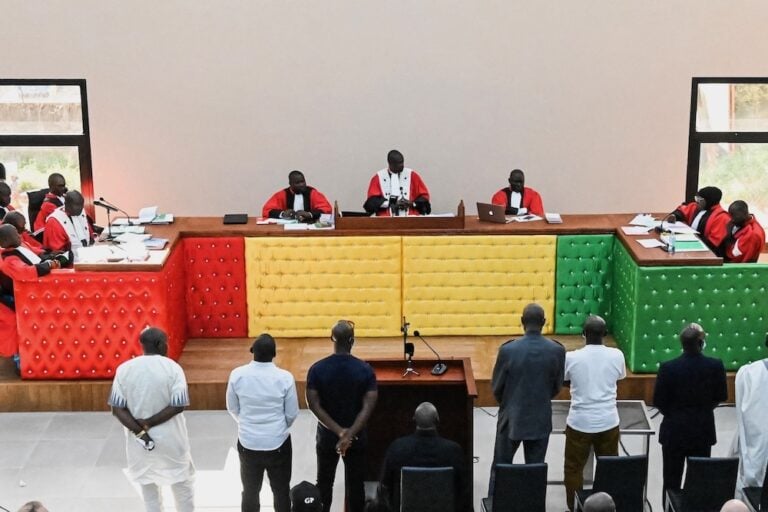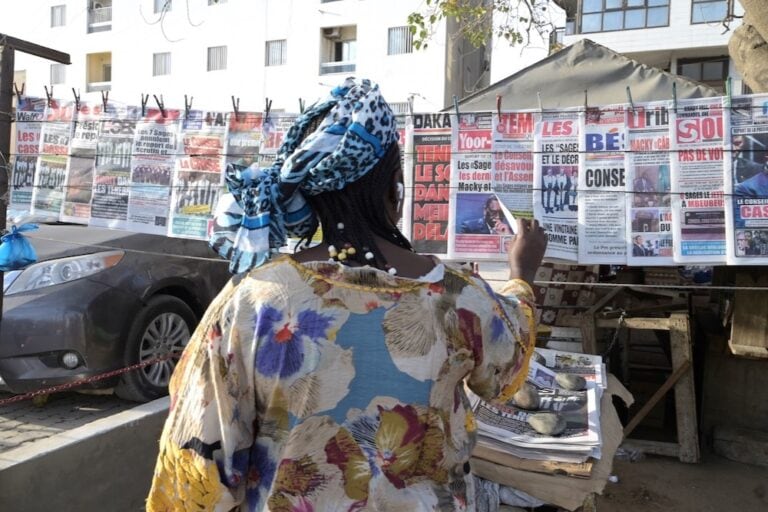CPJ urges president to decriminalise press offenses and address culture of impunity.
CPJ urges Senegal to decriminalize press offenses
(CPJ/IFEX) – In a 23 September 2009 letter to President Abdoulaye Wade, CPJ urged him to decriminalise press offences and address culture of impunity for those who attack journalists:
September 23, 2009
His Excellency Abdoulaye Wade
President of the Republic of Senegal
c/o Permanent Mission of Senegal to the United Nations
238 E. 68th St.
New York, NY 10021
Via facsimile: (212) 517-3032
Dear Mr. President,
The Committee to Protect Journalists is heartened by your recent directive to the prime minister to renew consultations with the press on the decriminalization of press offenses in Senegal. Yet your directive came on the same day a judge in the central town of Kaolack imprisoned two journalists who reported allegations of local government corruption in the distribution of seeds – a reminder of the urgent need for press law reform.
According to an official statement reported by the state-run Senegalese Press Agency, you asked the prime minister on Friday to start talks with the press. Also on Friday, Judge Mamadou Kane of the regional tribunal of Kaolack jailed reporters Papa Samba Sène of private daily L’As and Abdou Dia of Radio Futurs Médias, according to local news reports. Kane charged the journalists with defamation, publishing false news, and criminal
conspiracy under Senegal’s penal code based on a complaint by the regional governor, according to local journalists.
We urge you now not only to decriminalize press offenses, but also to address a culture of impunity for those who attack journalists and to review the police’s practice of interrogating journalists who criticize your administration.
In prepared remarks to your delegation in Washington last week, which included the foreign minister and the Senegalese ambassador, U.S. Secretary of State Hillary Rodham Clinton encouraged the government to “fight corruption,” and “make every aspect of government policy and operation more transparent and accountable.” However, since 2004, when you publicly called for a reform of Senegal’s 1977 Penal Code, at least 12 journalists have been sentenced to prison on libel charges, while charges against four others were dropped, according to CPJ research. In recent years, government prosecutors have charged journalists with various penal code statutes, including “threatening law and order” (Article 80), offending the head of state (Article 254), and publishing “false news” (Article 255). The administration has resisted the reform of press offenses, despite a comprehensive proposal submitted in December 2004 by civil society members and backed by UNESCO, according to our research.
Mr. President, we also ask you to review long-standing censorship and intimidation practices, such as interrogating journalists and blocking the distribution of information or views critical of your administration. This year for instance, a judge blocked the distribution of the June edition of the monthly newsmagazine L’Essentiel, ruling that its headlines, which criticized your government’s performance, risked “gravely disturbing public order,” according to news reports. On August 28, the Criminal Investigation Division of the Senegalese police interrogated three journalists of daily Le Quotidien for several hours, pressing them to reveal sources and retract stories critical of the administration, according to the same sources.
Finally, we urge you to use your influence to address a pattern of impunity for those involved in harassing and attacking journalists for their coverage. For example, none of the policemen involved in the June 2008 beating of sports journalists Babacar Kambel Dieng and reporter Kara Thioune have been charged, according to local journalists. In fact, CPJ investigations found that members of your administration, supporters of your party, security forces, and followers of the politically influential Mourides Muslim brotherhood involved in incidents of physical and verbal abuse of journalists have seldom been publicly brought to account or prosecuted to the full extent of the law.
We would like to encourage you to continue to take positive steps toward restoring your country’s reputation as a haven of press freedom. Thank you for your attention to this matter.
Sincerely,
Joel Simon
Executive Director


